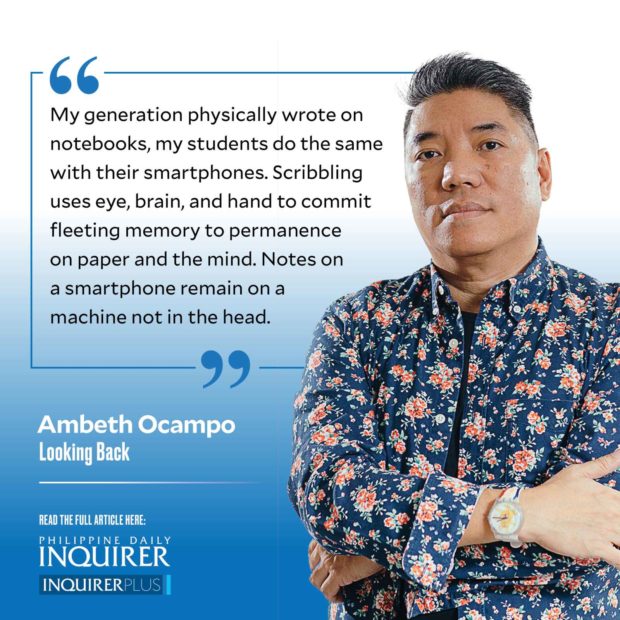Historical generation gap
Watching a younger historian, my friend Ian Alfonso, look for a book in the National Historical Commission Library the other day underscored the fact that I was born in the last century. Watching him fiddle with the Online Public Access Catalog or OPAC in search of a book was itself an expression of a generation gap. He first searched under Author, then by Title. When he couldn’t find what he wanted, I suggested they update their library program with something more intuitive. The librarian was new and did not know the lay of the land like the back of her hand as older ones would. She needed OPAC too. I felt like a dinosaur from the Analog Age nearing extinction.
I have had love affairs with libraries since my grade school days, and remember with fondness those that left me alone to roam the open shelves (UP, Ateneo, DLSU, San Beda, Lopez Museum, and Filipinas Heritage Library). My intimacy with Filipiniana grew from knowing Rizaliana was filed: under “R52” using the Dewey Decimal System or under “DS675.8 R5” using the Library of Congress classification system. In time, I grew to know not just the location of books but recognized them by size and thickness or by spine or cover color. Some books I identified by touch, from their bindings, others by the smell of the pages. I could tell different editions of the same book from each other. I knew which books were filled with marginalia. Evidence of readers engaging with texts would be frowned upon by librarians who would label these readers as vandals for defacing books with their scribblings.
Article continues after this advertisementI paint a romantic picture of research because my experience has been truly so, and there have been times that, while going over the shelves aimlessly or hunting for a particular book, I came across something important that I was not looking for, something I did not know was there. It is called serendipity.
My generation physically wrote on notebooks, my students do the same with their smartphones. Scribbling uses eye, brain, and hand to commit fleeting memory to permanence on paper and the mind. Notes on a smartphone remain on a machine not in the head. My only problem is remembering or finding one specific memory in an ocean of memories collected over a lifetime.
OPAC is great but it has its issues. Once I visited the archives of the Spanish Foreign Ministry in Madrid in search of a particular document: the Spanish Consul’s 1897 report on Filipino filibusteros or “personas sospechosos” in Hong Kong. Everything was supposed to be on OPAC but the document was not in the system. When I inquired, the archivist punched in a few keys and threw his hands in the air saying: “No existe.” How could it not exist, I replied, I saw it 20 years ago. At my prodding, the young archivist consulted someone senior who located the missing document. What happens when books or documents are misfiled or someone missed encoding pertinent data on OPAC? What a tragedy for history and historians if these omissions are done on purpose, with intent to censor or conceal truth.
Article continues after this advertisementDoreen Fernandez, in freshman year, told us never to reshelve library books. Leave them on the desk or place them on the Return cart. Never hide books behind the shelves because if you forget that book will be “missing” and inaccessible for at least a year till the annual inventory when all books are taken down and reshelved. To drive home the point, we were told of a librarian denied retirement benefits due to rare books lost in her care. By the time the missing books were found, after inventory, the librarian had passed away with a broken heart.
OPAC is great, it allows me to search faster than you can spell Google. It allows me to preorder books before I physically turn up in a library. Convenient for seldom requested books banished to off-site storage. In my time, we used the Card Catalog, alphabetically arranged cards with typewritten data arranged by Author, Title, and Subject. Searching through these can be quite an experience, and in a specialized library like that of the Agustinos Filipinos in Valladolid, Spain, it took me two days to go over all the cards filed under “Filipinas.” My library methods may point to obsessive-compulsive disorder, but research is air to the historian, it is life.

















